AI agents for ecommerce: Use cases, examples, and the rise of agentic commerce

AI agents for ecommerce: Best use cases, examples, and the rise of agentic commerce
AI agents—autonomous algorithms empowered to act on behalf of users—are fundamentally reshaping how people shop and ecommerce retailers operate.
According to recent Adobe research, 24% of online shoppers now skip Google entirely in favor of agent-driven AI platforms like ChatGPT because it's more efficient. Rather than manually sift through search results, shoppers receive a curated list of products in seconds. This shift to agentic commerce—where agents handle everything from product discovery to purchasing for consumers—is already disrupting the direct web traffic and traditional SEO that digital retailers have long relied on.
Beyond reshaping the customer journey, AI agents are also setting a new standard in operational efficiency, profitability, and business intelligence. By analyzing and applying real-time data intelligently, they can automate complex workflows, improve decision-making, and scale the delivery of hyper-personalized marketing that simultaneously drives growth and customer experience (CX).
Read on to learn the eight best use cases for AI agents in ecommerce, their benefits, and how agentic commerce is poised to unleash a new era in online retail.
What are AI agents?
AI agents are autonomous software systems empowered to act on a user’s behalf in pursuit of predefined goals.
Unlike previous AI tools like chatbots that only react when prompted, AI agents have a degree of autonomy. They can perceive their environment, interpret and access real-time data, and make informed decisions on their own. This enables them to tackle complex goals from start to finish across connected systems without human intervention—all while adapting to changing conditions and learning from experience. Agents also have memory, enabling them to anticipate customer needs and tailor personalized experiences to boost satisfaction and loyalty.
In short, autonomous AI agents are poised to unlock a new level of personalization, business intelligence, and operational efficiency in ecommerce.
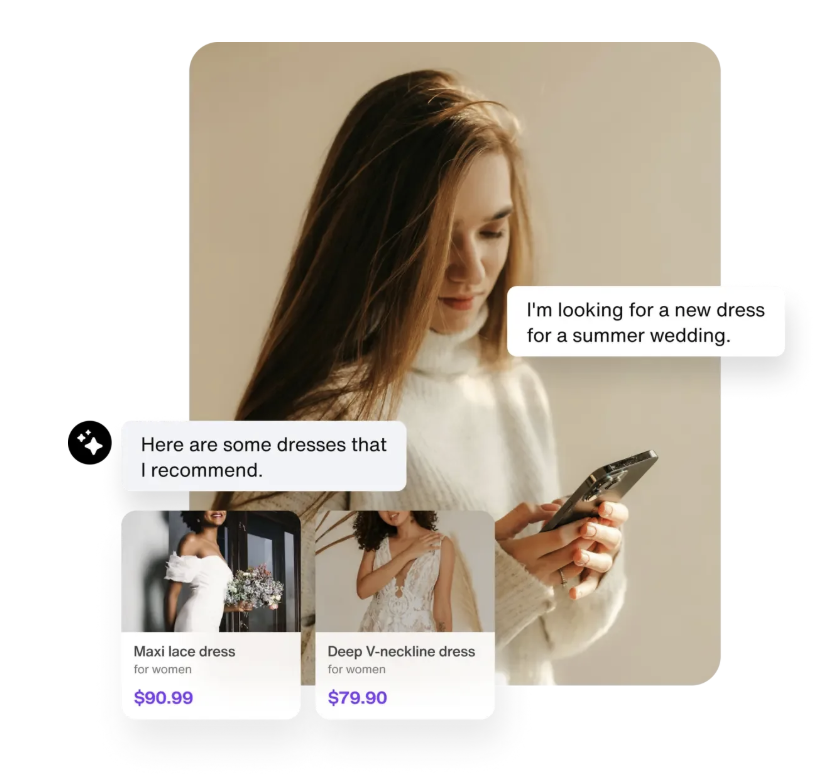

Build lasting customer trust with reliable AI agents
AI agents vs traditional AI software: What’s the difference?
The key difference between AI agents and previous AI tools is agency. Both technologies can use natural language processing (NLP), large language models (LLMs), and machine learning (ML)— but only agents can reason, decide, and act on their own in real time.
Traditional AI software are like power tools—precise for specific tasks but inflexible and reactive, requiring human input or explicit programming. For example, a genAI chatbot can only pull data from a product catalog to answer a WISMO query when prompted by users.
AI agents are like digital coworkers that use tools to perform complex tasks end-to-end. Faced with a WISMO query, an AI agent can retrieve customer data using an API, confirm delivery status with external systems, then trigger a refund or replacement—all without human intervention.
Types of AI agents for ecommerce
AI agents for ecommerce can be purpose-built to serve various roles that span online CX and operations. Some of the most popular are:
Personal shopping assistants that drive product discovery or reorder household essentials automatically
In-store support that guides shoppers via kiosks or mobile apps with real-time aisle information, stock checks, and product comparisons
Customer support AI agents that handle basic queries, returns, WISMO, order modifications, and route intelligently if needed
Merchandising optimizers that deliver personalized promotions by segment, behavior, or stock levels
Procurement agents that identify suppliers, evaluate quotes, source materials, and manage complex B2B purchasing workflows.
Commerce agents that research, compare, and purchase products or services on behalf of customers (or other businesses in B2B ecommerce).
Even though AI agents can operate autonomously in real-time environments, they still require goals and objectives to be defined by the humans who build AI agents and manage them.
The impact of AI agents in ecommerce
The introduction of AI agents heralds a seismic shift in the ecommerce landscape at a technical, organizational, and experiential level. Driving this change are two core factors:
1. Agentic commerce: Reshaping the buyer’s journey
AI agents introduce a new paradigm of online shopping—agentic commerce—where agents act autonomously on behalf of customers, handling everything from product discovery to comparison to purchasing. Rather than users directly navigating websites and traditional search results, their agent-driven tool of choice does it all for them.
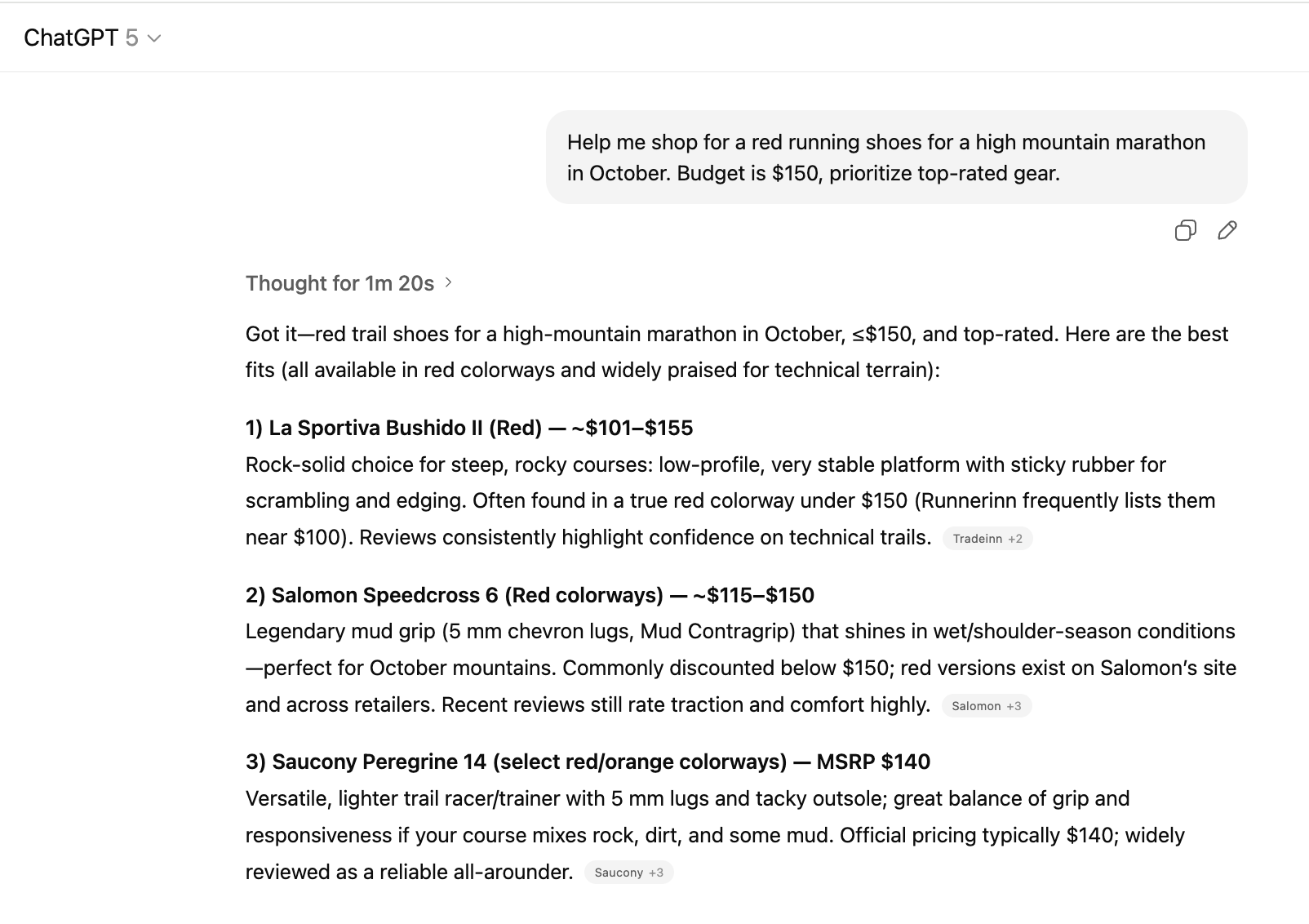
This shift from active search to delegated curation is fast underway. According to 2025 McKinsey research, 44% of users who have tried AI-powered search (AEO) say it’s now their “primary and preferred” source for internet searching. Meanwhile, in 2025, major payment providers such as Visa, Mastercard, and PayPal invested billions in making agent-led purchasing possible through agentic platforms like Perplexity and ChatGPT.
For customers, AEO is a faster way to get an internet-wide roundup of well-suited choices, ranked purely on relevance to their context and free from traditional advertising. Per Adobe, 36% of people and 47% of Gen-Z have discovered a new product or brand using ChatGPT.
For businesses, AEO is a new source of leads outside of SEO, but it brings new requirements. To remain competitive, companies must optimize both for human search and agents searching on behalf of humans. Agents prioritize product data that’s well-structured, complete, and context-rich, meaning poor product listings are effectively invisible, resulting in missed sales.
Like mobile commerce before it, agentic commerce is redefining CX and brand visibility for online retailers. Experts say that agents will increasingly serve as the gatekeepers of digital commerce, becoming the primary interface between customers and marketers.
2. Agentic architecture: Unifying the fragmented ecommerce ecosystem
Agentic architecture—a blueprint for designing and orchestrating systems of autonomous AI agents—represents a breakthrough in how digital retailers operate. Rather than relying on siloed systems that don’t share data or adapt effectively, agentic AI enables the creation of one unified, data-first ecosystem where multiple agents collaborate across connected systems, using real-time data to make optimized, context-aware decisions at scale.
Say a customer receives a delivery notice but finds their package missing upon retrieval. When asked “Where’s my order?”, the ecommerce agent queries the logistics, CRM, and external carrier systems to verify delivery. This agentic workflow could even trigger a fraud detection AI agent to check for repeat refund requests—all before sending a personalized update to the customer about next steps.
This architecture also allows for more agile and customer-centric operations across logistics, marketing, and revenue. From dynamic pricing to inventory management to last-mile delivery, it enables smarter automation and decision-making that cuts costs and fuels growth. It also ensures agents can feed these live insights back into systems or models to drive continuous improvement.

How to choose an AI agent platform that works
8 best AI agent use cases in ecommerce with examples
AI agents represent a shift from reactive to proactive, data-driven operations in ecommerce. By unifying data, acting it in real time, agents offer ecommerce businesses new ways to scale high-quality tailored interactions, optimize processes, and reduce costs.
Here are the eight best use cases with real-life examples to inspire and guide your own AI in ecommerce:
1. Agentic commerce
Agentic commerce marks a fundamental shift in how brands build relationships and support customers, so it deserves a deeper exploration. By understanding user intent and context, AI agents can deliver deeply researched, personalized recommendations based on past purchases, preferences, budget, and trending items. Embedded in apps, websites, and interfaces, these AI shopping concierges guide discovery and purchasing—creating a faster, more convenient experience that drives engagement and loyalty.
For example, Instacart’s “Ask Instacart” feature lets shoppers describe what they need in natural language—”I’m hosting a taco night”—and instantly receive a tailored grocery list. Or, Amazon's new "Buy for Me" feature allows users to purchase products from third-party websites using agents, without ever leaving Amazon.
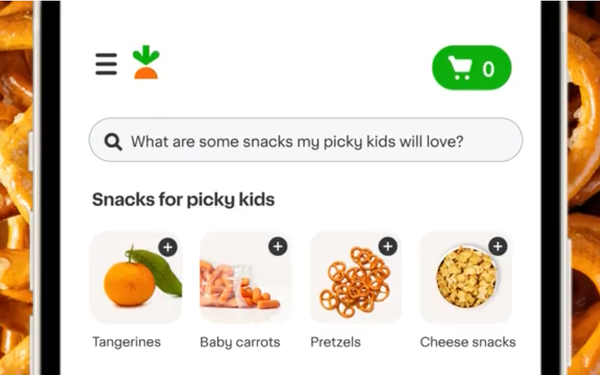
Crucially, agents don’t shop like people. They don’t respond to marketing narratives or name recognition. Instead, they scan structured, machine-readable product data for information about price, availability, ratings, and features to identify the most relevant offerings. This means businesses must expand from brand-led positioning (“We are Nike”) to include scenario/context-led positioning that appeals to agents. (“Best running shoes for rainy high-mountain marathons”). This enables businesses to “speak” to agents—driving visibility, discovery, and conversion in the AI-powered future.
According to Adobe, 47% of marketers and business owners use ChatGPT to promote their business, and 76% said it's essential for their brand to appear in AI-powered search results. That indicates AI visibility will be a core factor in ecommerce success in 2026 and beyond.
2. Hyper-personalization based on real-time context
A full 81% of shoppers prefer brands that personalize their experience, so it pays for retailers to deliver the most contextually relevant interactions across the customer journey. Historically, this has been epitomized by Amazon’s AI-powered recommendation engine, which tracks browsing and purchasing history to tailor suggestions, and by genAI chatbots that suggest products or content based on static business training data.
AI agents take personalization to the next level. Rather than relying solely on historical data, agents can combine CRM and other data with real-time context signals—customer sentiment, cart status, inventory, even external data like weather or local events. This allows them to deliver the most relevant product recommendation or experience for that exact moment.
For example, an ecommerce AI agent can detect that a shopper has stalled on the checkout page, and proactively offer a coupon for free shipping or a discount before they bounce to help close the sale.
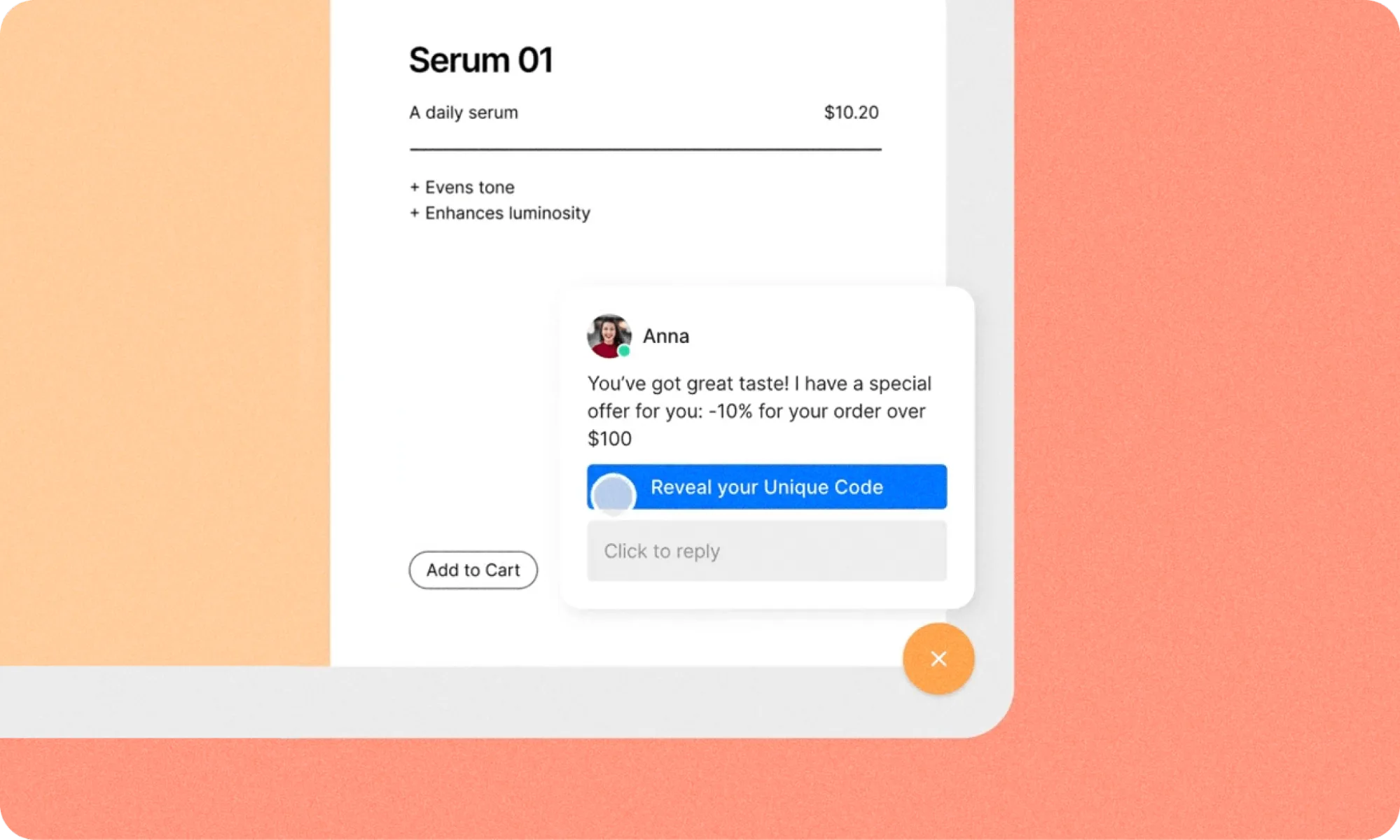
By combining real-time connectivity and omnichannel decision-making, agents are redefining what it means to tailor customer experiences at scale. With access to unified insights from marketing, logistics, and customer service, they can adapt dynamically to each user’s needs in the moment. This 360-degree view enables retailers to meet ever-increasing customer expectations, increasing conversion and loyalty by providing customers more of what they actually want in the moment.
3. Enhanced CX with continuous conversations
In the age of free returns, ecommerce success depends on earning loyalty from increasingly selective shoppers. At a time when 90% of consumers say the post-purchase experience is just as important as the product itself, this means delivering a seamless, satisfying experience at every point in the buying journey.
By remembering past interactions, AI agents enable online brands to bring a new level of continuity and convenience to their CX. Previously, genAI chatbots offered 24/7 assistance across support channels, using NLP to answer FAQs, recommend products, and automate basic tasks. But because they lacked memory, each interaction started from scratch—forcing customers to repeat themselves when switching channels or returning later.
AI agents eliminate this friction. By storing interaction history and context, agents can resume a previous customer conversation where it left off—regardless of whether it initiated on chat, email, or in-app—without re-explaining the issue.
For example, an ecommerce agent can greet returning customers and pre-populate the chat with relevant information based on recent cross-channel activity, such as return or exchange policies, alternate sizes and colors, or upsells and cross-sells. This helps retailers to improve customer service metrics, enhance personalization, and set themselves apart from competitors.
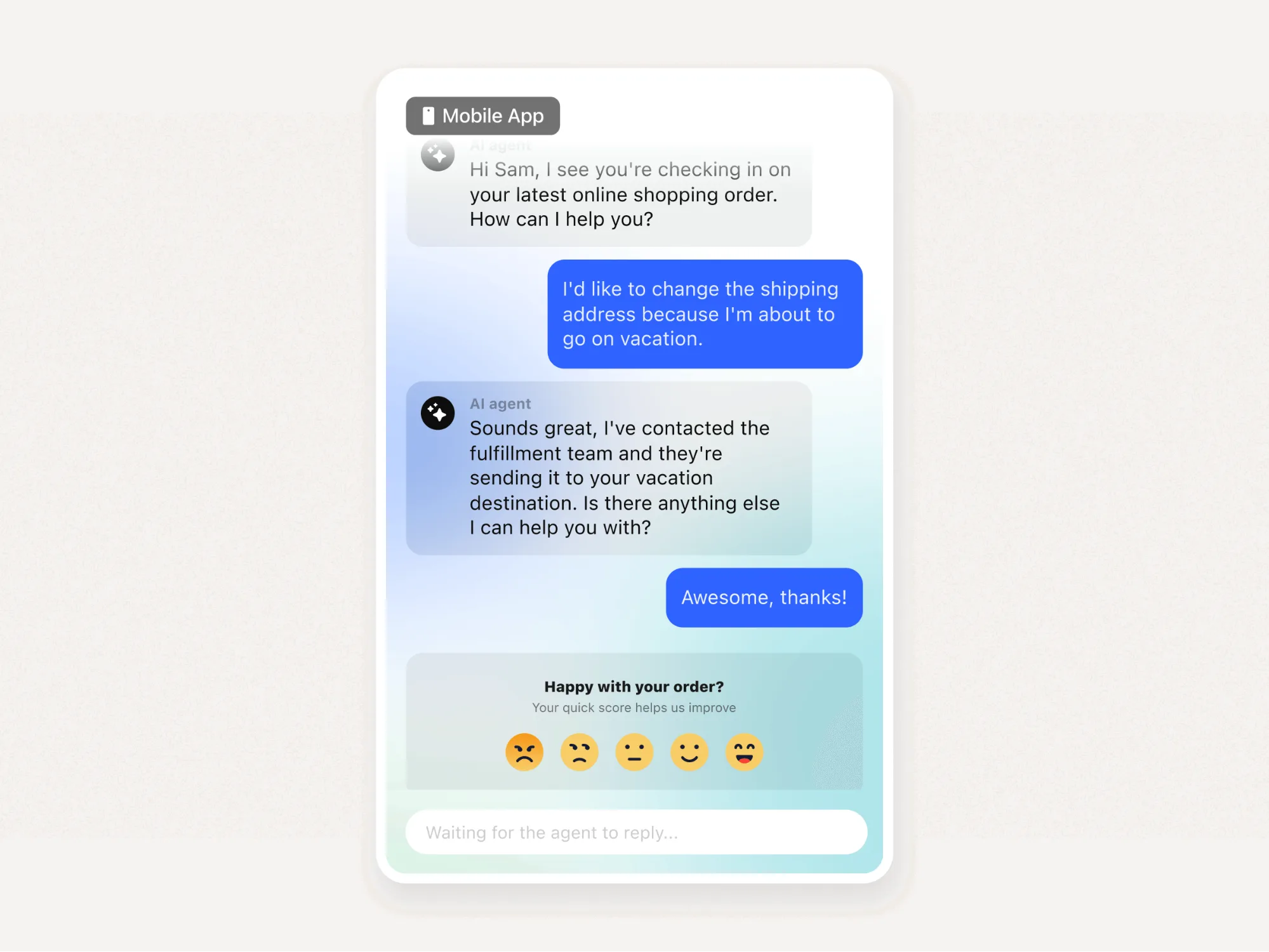
The result is a smoother customer experience and reduced workloads for human support teams. Plus, if escalation is needed, all context is at hand, helping to accelerate issue resolution and boost customer satisfaction.
4. Conversational commerce with voice-enabled AI
Millions of shoppers already ask AI agents to build grocery lists, reorder essentials, and find new products via natural language interactions. In fact, 22% of consumers say they prefer using voice-enabled AI assistants like Alexa and Google Assistant to typing. This makes conversational commerce an increasingly key differentiator among ecommerce brands.
AI agents, using natural language processing (NLP) and voice recognition capabilities, can engage customers in real-time dialogue just as if by typing. They can compare prices, discuss product features, check service availability, get support, or make purchases across channels as if they were talking to a human.
For example, apparel retailer Stitch Fix is experimenting with conversational shopping experiences that use AI agents to facilitate live conversations with human stylists. Customers can ask human stylists for outfit suggestions and receive curated recommendations—all part of an agent-driven chat flow in the app that feels personal, easy, and on-brand.
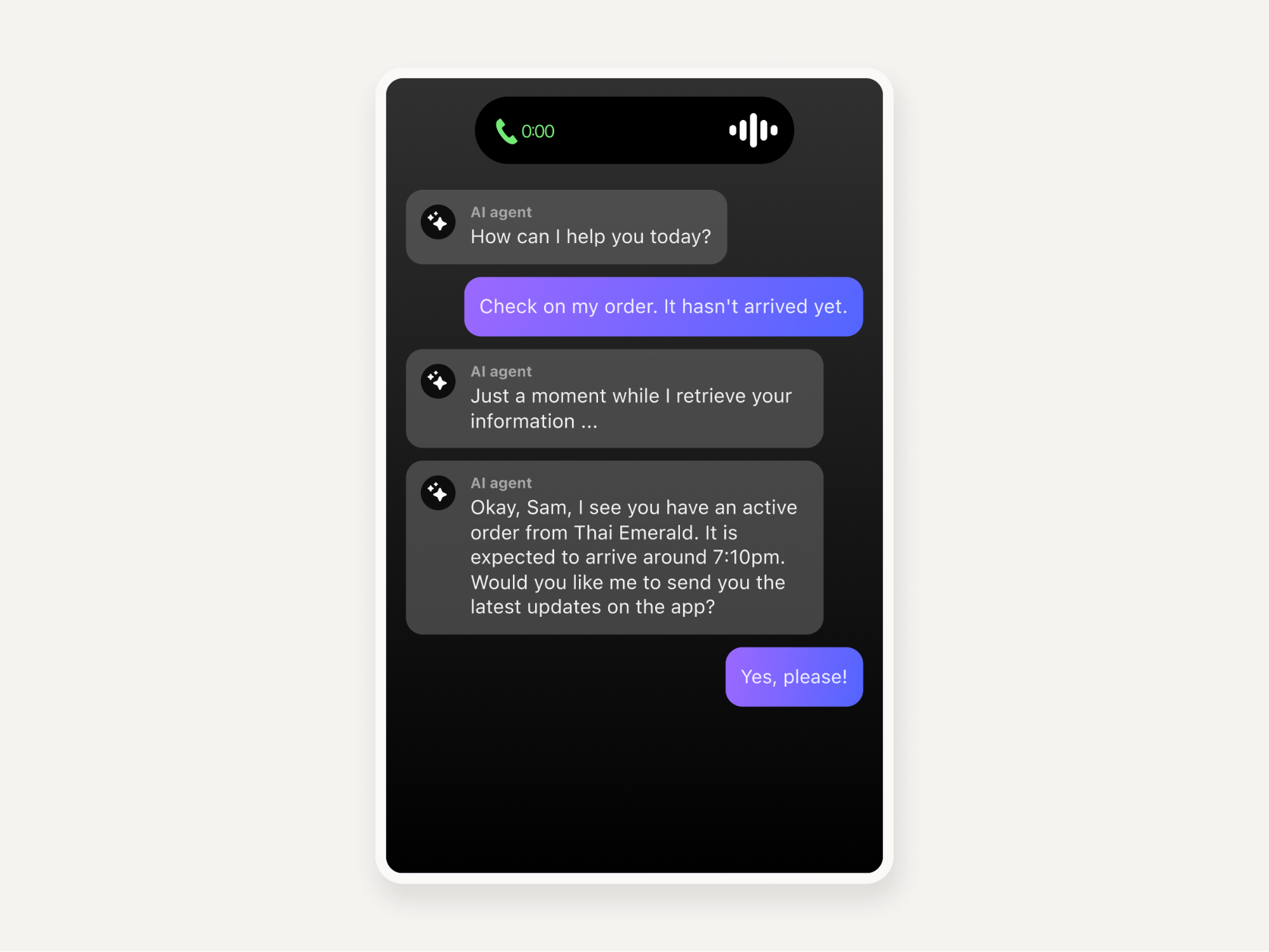
5. Proactive fraud prevention at scale
Ecommerce fraud prevention has traditionally relied on static detection models that flag anomalies after they occur. AI agents changes this. By continuously monitoring transactions, evaluating purchase data, and identifying subtle irregularities that static systems may overlook, agents can act in real-time to detect and stop threats before they escalate.
Unlike traditional fraud detection tools that simply analyze historical patterns, AI agents actively observe, reason, and intervene across systems instantly. Say a customer attempts a $1,500 purchase with a new credit card registered in another country. An AI agent can instantly assess risk factors, query address verification systems, and detect that the shipping and billing addresses don’t align. Within seconds, it can pause the transaction, trigger step-up verification, and alert the fraud team—all without human input.
By serving as always-on digital sentinels, AI agents bring autonomous reasoning and action to fraud prevention. They can help reduce chargebacks, prevent account takeovers, and secure customer trust—without disrupting the experience for typical shoppers.

Read the full report + in-depth CX case studies
6. Optimized operations with multi-agent systems
Agentic AI is poised to revolutionize how the ecommerce industry approaches logistics, supply chain management, and package delivery. By deploying multi-agent systems—networks of specialized, autonomous AI agents that collaborate toward shared business goals—retailers can now orchestrate complex workflows that once required human intelligence.
Each agent in a multi-agent ecosystem has its own purpose and intelligence: one might forecast demand, another manage inventory, while a third coordinates delivery logistics. Together, they collaborate to automate complex workflows and achieve complex goals too much for previous AI technology.
Take Amazon, for example. Its operational network already embodies the power of multi-agent collaboration. The inventory agent informs the recommendation agent which products are in stock, while the delivery optimization agent determines the most efficient fulfillment route. Meanwhile, Amazon Q in AWS Supply Chain acts as a reasoning layer across these systems—analyzing supply chain data, surfacing insights, and answering urgent operational questions in real time to improve efficiency.
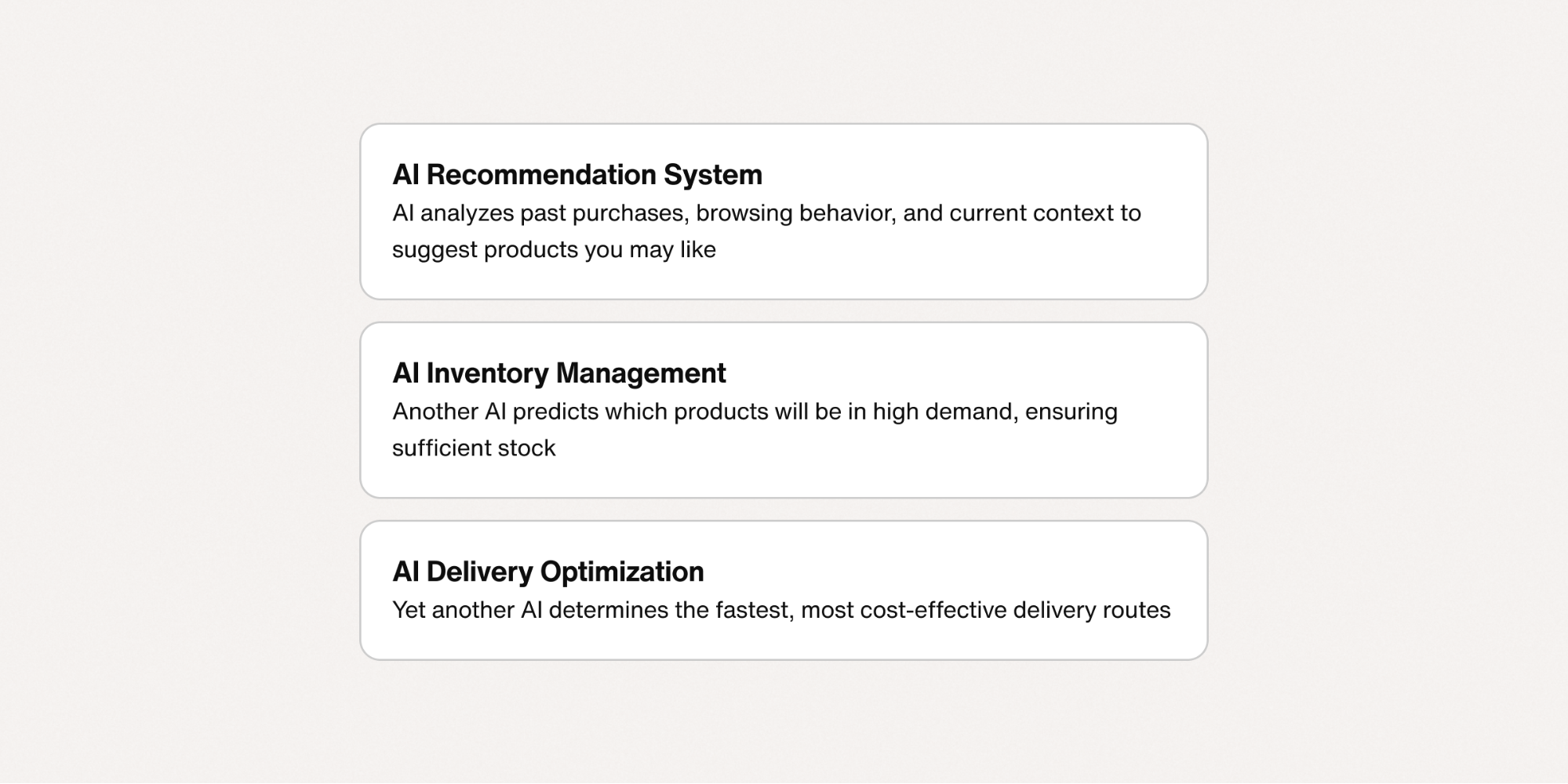
By orchestrating a team of vertical AI agents as part of a unified multi-agent system, ecommerce business can improve operational efficiency and profitability by better predicting demand, optimizing inventory, and ensuring timely delivery across the world.
7. Seamless omnichannel experiences at scale
Beyond creating new efficiencies, AI concierges act as the bridge between otherwise disjointed enterprise systems and channels—making the elusive dream of a seamless omnichannel customer experience an operational reality for retailers.
By integrating AI agents across the customer journey, retailers can automate customer support at scale. Finally, customers will be able to switch between websites, channels, in-store interactions, and support calls without losing context. This way, when human support agents take over from AI agents, there will no longer be a frustrating pause for customers as teams get up to speed. Instead, all context across all channels has been maintained, delivering a seamless customer experience across different languages and regions, translating to greater customer loyalty and turning support into a strategic revenue-generating advantage.
8. Driving app engagement and loyalty
According to a survey of over 1,000 US adults, over 60 % have used conversational AI for shopping. Retailers are using these increasingly popular ecommerce agents to drive app engagement and loyalty program signups. Agents can guide in-store experiences through the user’s mobile app and deliver live offers based on real-time in-store behavior and history. By pairing price and location information in the app with actionable offers, retailers can encourage digital in-app interactions that lead to more loyalty program involvement.
For instance, a retailer wholesaler features an AI concierge in its mobile app and in-store kiosks. The agent helps customers navigate its brick and mortar locations, find price and location information, all while delivering actionable, location-sensitive offers that tie back to its loyalty program. This reliably increases the retailer’s app engagement, guides the in-store customer journey to drive purchasing, and gathers valuable customer-specific insights.

5 key questions to vet an AI agent platform
Benefits of AI agents for ecommerce
AI agents offer a variety of advantages to both consumers and businesses compared to traditional automation and previous AI tools. Some of the major advantages include:
Hyper-personalization at scale
By using real-time context, memory, and data spanning systems and customer history, AI agents deliver a new level of tailored experiences to each customer to enhance brand loyalty and drive growth.
Seamless omnichannel engagement
Because agents operate across platforms using live data, they can provide a consistent CX across channels, for in smoother customer journey, fewer support queries, and better engagement.
Operational efficiency and cost reduction
By automating routine tasks like inventory checks and handling support queries instantly, agents free human teams to focus on high-value work, reducing costs and errors.
Data-driven decisions and insights
By tapping into live data from internal systems, third-party platforms, and market activity, AI agents bring real-time insights to drive analysis and decision-making, giving retailers a competitive advantage.
Scalability for all seasons and regions
When support tickets or customer queries surge, localized, multilingual AI agents can scale seamlessly to support product launches, seasonal traffic spikes, and global operations.
The future of AI agents in ecommerce
As AI in ecommerce continues to evolve, it’s shifting from the reactive capabilities of generative AI tools toward the proactive autonomous systems of AI agents that drive agentic commerce. By automating tasks, optimizing operations, and hyper-personalizing experiences, AI agents for ecommerce are soon to be an essential technology for retailers that want to scale high-quality interactions, deliver exceptional experiences, and stay competitive in the marketplace.
If you’re looking to build AI agents for ecommerce, Sendbird can help.
Our robust AI agent platform makes it easy to build AI agents on a foundation of enterprise-grade infrastructure that ensures optimal performance with unmatched adaptability, security, compliance, and scalability.
Curious how Sendbird helps ecommerce leaders to scale high-quality support and CX while cutting costs and boosting CX?
Contact sales today.

















